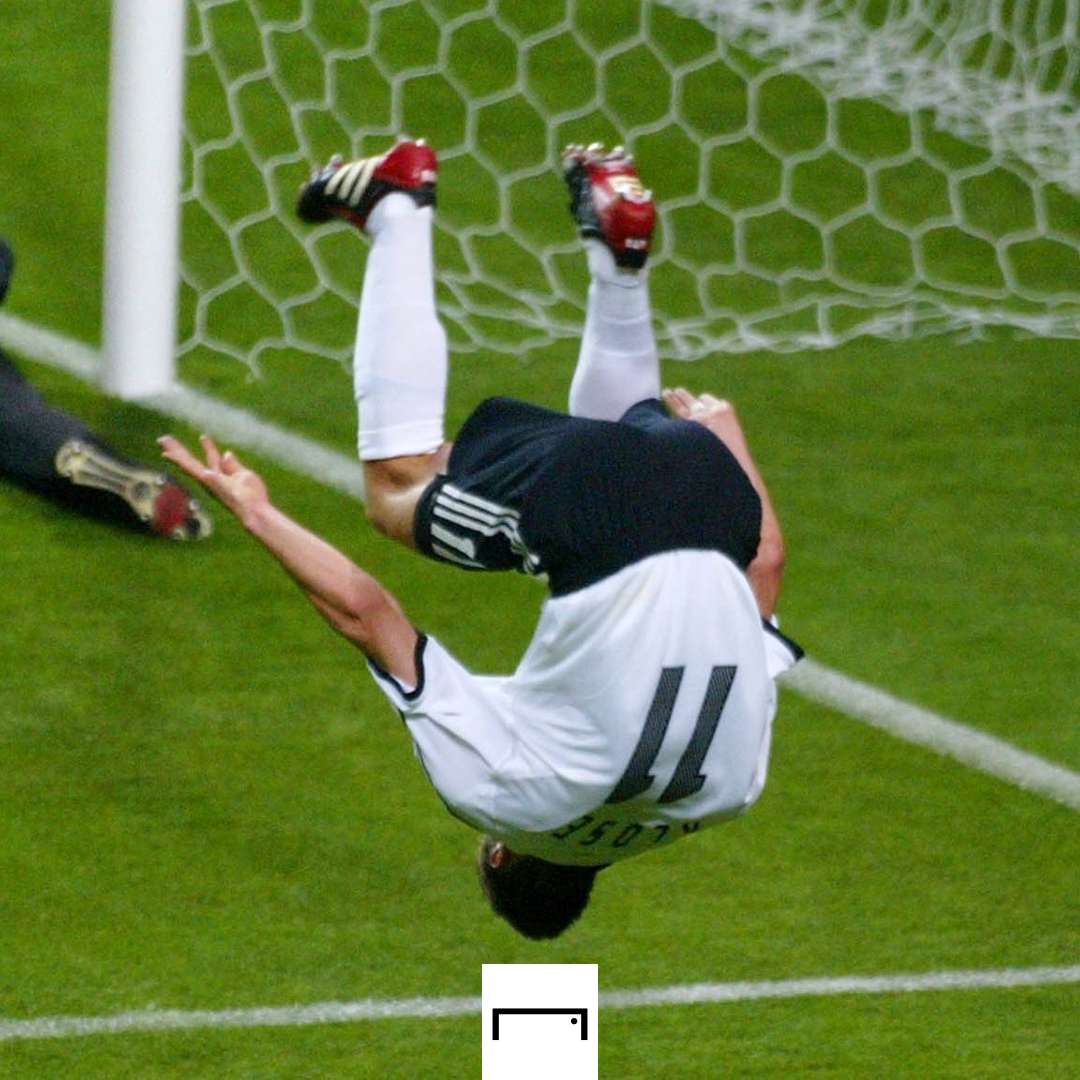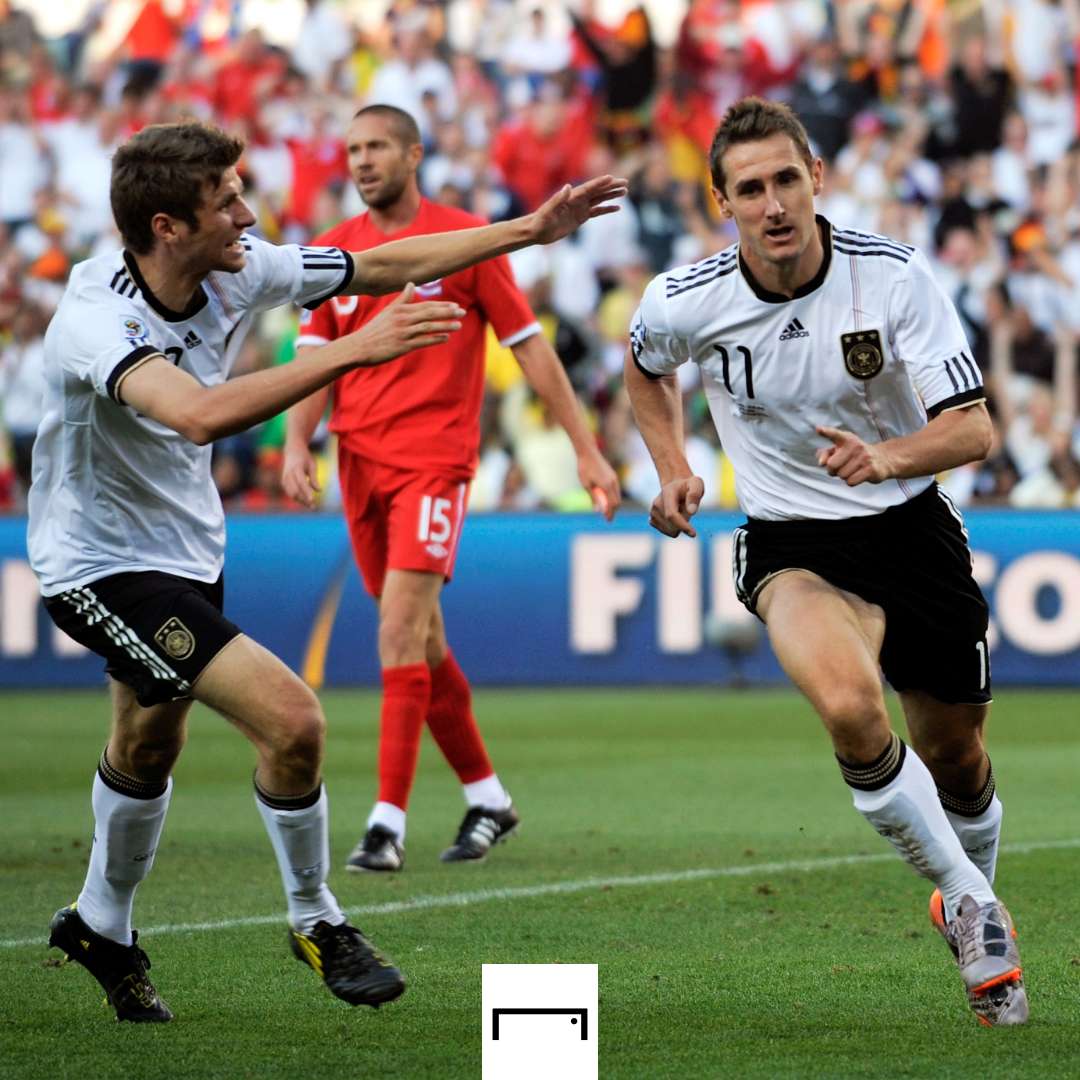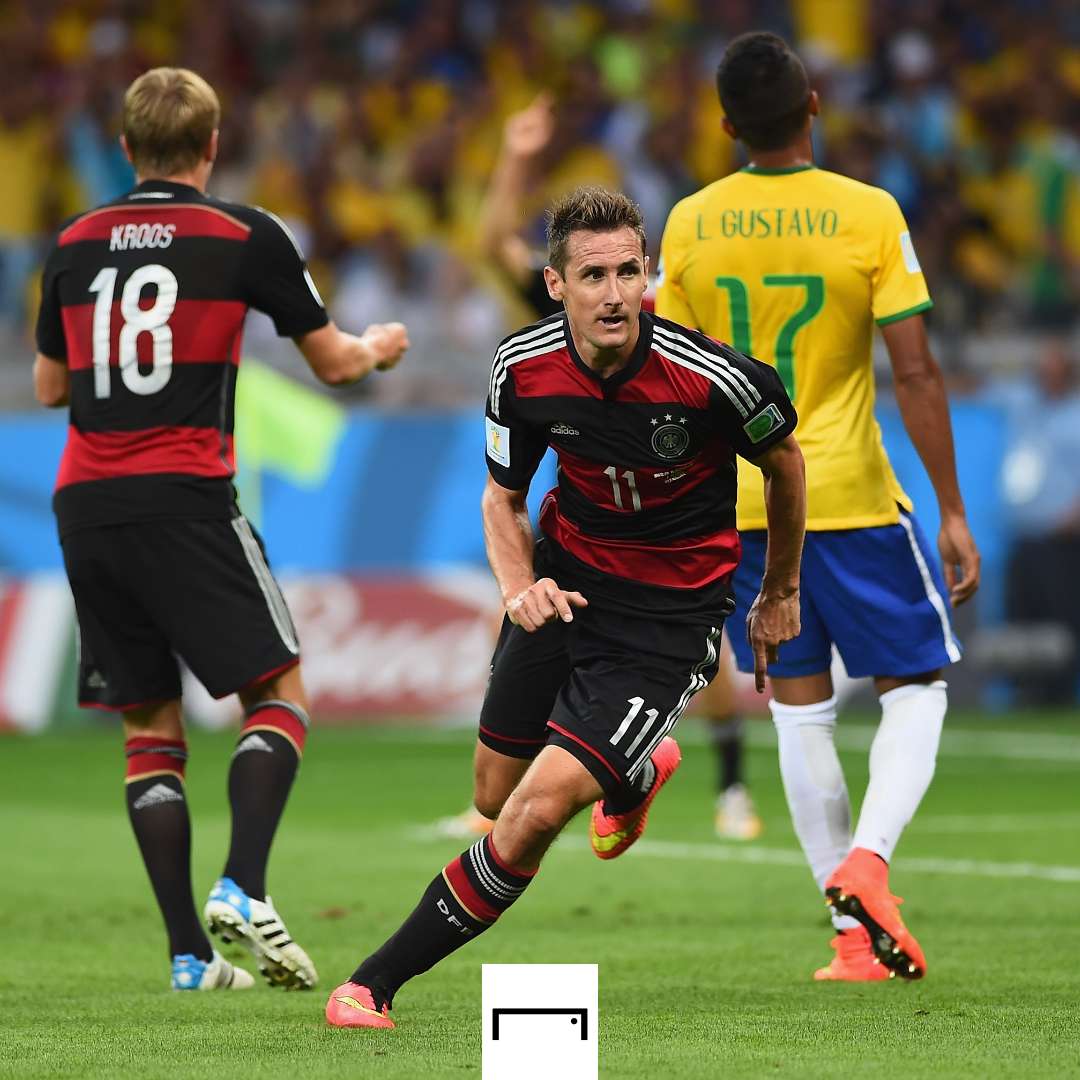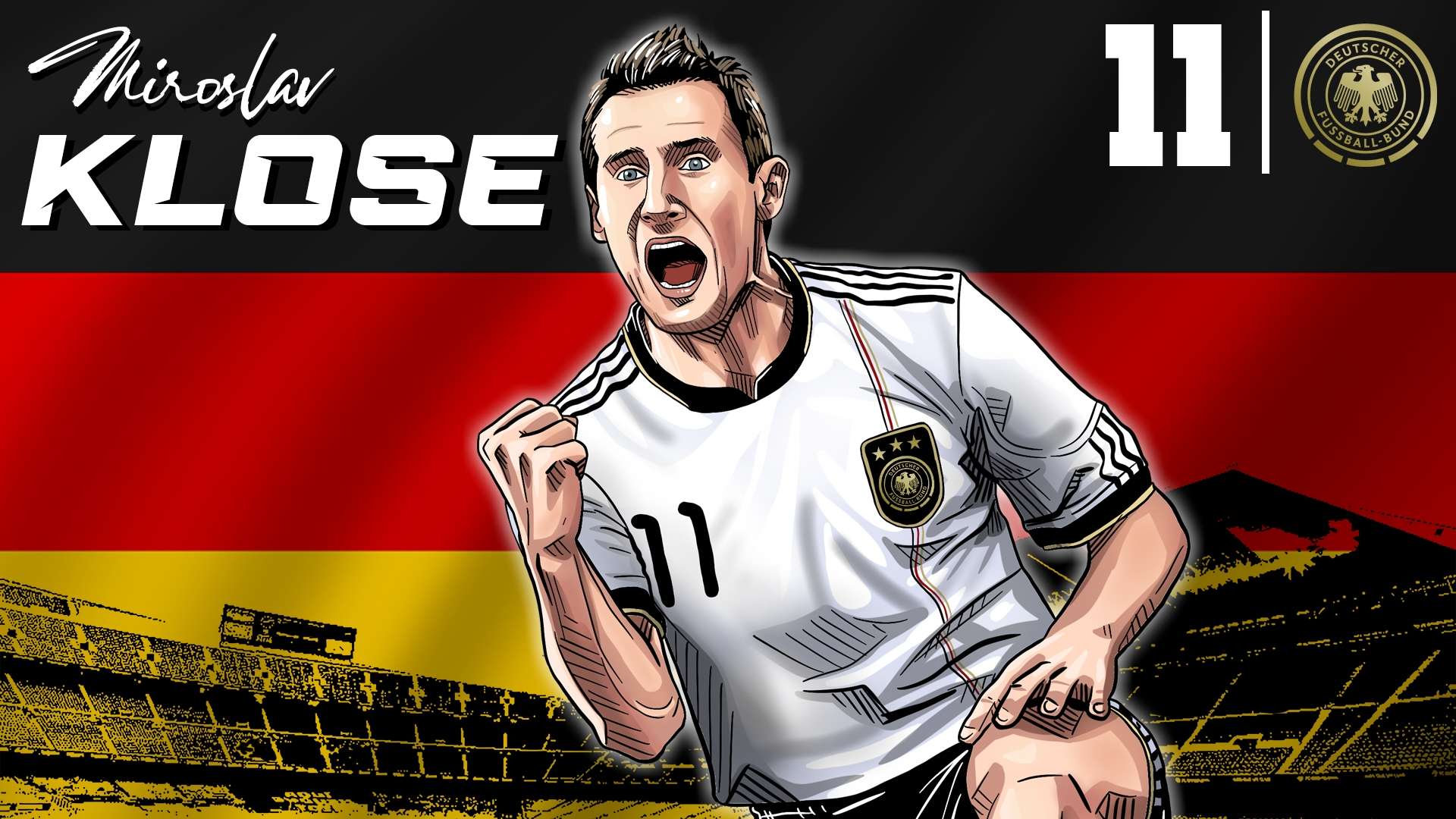Miroslav Klose enjoyed a fruitful club career, winning two Bundesliga titles, two DFB-Pokal crowns and the Coppa Italia.
During spells at Werder Bremen, Bayern Munich and Lazio, among others, the striker also scored a highly respectable 258 goals in 668 matches.
However, his enduring legacy was carved out while playing for his country.
Germany handed the striker his maiden call-up in 2001, and he had no hesitation in choosing to represent Die Mannschaft over Poland – his country of birth.
“I have a German passport,” Klose said. “And if things are still running this way, I have a chance to play for Rudi Voller.”
Within the first 15 minutes of his international debut against Albania, Klose registered the first of his 71 goals for Germany and introduced the masses to his iconic backflip celebration.
Klose then earned the central striker berth in Voller’s 2002 World Cup squad and his first appearance at the Japan and South Korea tournament was one for the ages.
Germany annihilated Saudi Arabia 8-0 in their group stage opener and Klose helped himself to a hat-trick of headers.
He also nodded home in subsequent fixtures against Republic of Ireland and Cameroon, becoming the first man to score five headers in a single World Cup finals.
 Getty/GOAL
Getty/GOALVoller’s side made it all the way to the final, only to lose against a Ronaldo-inspired Brazil, but Klose’s World Cup journey was only just beginning.
Expectation levels rose dramatically over the next four years as Germany prepared to host football’s most prestigious tournament, with Klose warming up by scoring 31 goals in 40 appearances for Bremen in 2005-06.
Jurgen Klinsmann was the man charged with delivering Die Mannschaft’s fourth World Cup after succeeding Voller, and he, too, placed his trust in Klose to deliver the goods in the final third.
Klose didn’t disappoint, netting braces in wins over Costa Rica and Ecuador to help Germany advance to the knockout stage.
The hosts saw off Sweden in the last 16 to set up a colossal tie against Argentina, during which Klose scored a crucial late equaliser to send the contest into extra-time.
Germany eventually triumphed on penalties, but succumbed to eventual winners Italy in the semi-finals.
Klinsmann’s side signed off with a third-place play-off win over Portugal, while Klose also landed the consolation prize of his first World Cup Golden Boot for his five-goal haul.
Fast forward four years to the inaugural African World Cup, and Klose was shouldering more than just the expectations of an entire nation – he had his eye on Ronaldo’s tournament record of 15 goals.
In the build-up to South Africa 2010, he said: "I'm looking for at least five goals at the finals."
Klose was confident despite only netting three league goals for Bayern Munich the season prior. So was his manager, Joachim Low, who had been Klinsmann’s assistant in 2006.
"I have a good feeling about Miro. I think he'll rediscover his old form and physical freshness,’’ Low said at a pre-tournament press conference.
 Getty/GOAL
Getty/GOALKlose ultimately failed to hit his goals target as Germany suffered semi-final heartbreak once again, this time at the hands of eventual champions Spain.
He did, however, manage to find the net on four occasions, including a stunning brace in a 4-0 drubbing of Argentina and a trademark sliding finish in their 4-1 demolition of England.
Still, Klose believed he had missed his date with destiny and couldn't envisage a final shot at the trophy and goals record as a 36-year-old in Brazil four years later.
"I do sense a touch of regret. I don't think I'll play at the World Cup again," he said after the tournament.
Little did he know that Brazil 2014 would prove to be the platform for one of the game’s most memorable swansongs.
Low included Klose as the only recognised centre-forward in his squad for the World Cup but, crucially, he was backed up by the creative talents of Mesut Ozil and Mario Gotze and the attacking nous of Thomas Muller and Andre Schurrle.
Germany opened their campaign with a 4-0 thrashing of Portugal, but found themselves 2-1 down after just over an hour of their second group outing against Ghana. Low turned to Klose to bail his team out of trouble.
Two minutes after replacing Gotze from the bench, Klose produced a typically instinctive effort to turn home a flicked-on header at the back post, equalling Ronaldo’s World Cup record in the process.
Die Mannschaft went on to seal their fourth successive semi-final berth, and were faced with arguably their toughest challenge yet in the form of hosts Brazil.
Germany tore up the pre-match script, winning 7-1 to condemn the Selecao to their worst-ever World Cup defeat.
The one-sided nature of the victory somewhat overshadowed Klose’s career-defining moment in the 23rd minute, which saw him put Low’s men 2-0 up.
 Getty/GOAL
Getty/GOALHe steered the ball past Brazil keeper Julio Cesar at the second time of asking to become the highest-scoring World Cup player of all time.
Klose was trusted to lead the line again in the final against Argentina, and lasted 88 minutes before making way for Gotze, who scored the winning goal in extra-time.
The mantle had been passed, and Klose was ready to bow out on the highest of highs.
He confirmed his retirement from international football in November that year, declaring: "The success of the team stood and always stands for me in the highest place.
"Records never concerned me; it was always about giving my best for the team.”
Klose bowed out as Germany's all-time leading scorer, with 16 of his goals recorded in 24 appearances across four World Cups.
Maybe he has never received the credit he deserves, in no small part because of his unusually humble nature.
But history will remember him as the ultimate World Cup hero, a man for the big occasion who eclipsed some of the game’s greatest superstars through sheer determination and hard work.
